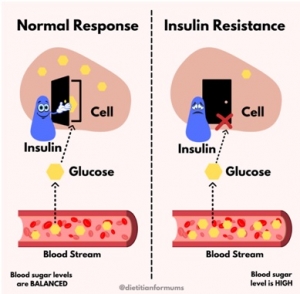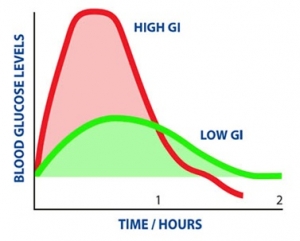PCOS& Insulin Resistance: What is the Link?
Control my blood sugar levels to protect your fertility


Polycystic ovarian syndrome (PCOS)is not just a localised condition of the ovaries. PCOS is in fact classed as a complex hormonal and metabolic condition,causing irregular periods, fertility difficulties and hormone imbalances, influencing various functions within the body(1).
If you have been diagnosed with PCOS, it is likely you may have heard a health professional mention the word ‘insulin resistance’. Still confused what this means and how it links to PCOS? A fertility dietitian can help! Continue reading to find out how!
How do you know if you have PCOS?
What is Insulin Resistance?
Studies have shown that up to 70 percent of women with PCOS have a degree of insulin resistance, whether that be mild or severe (2).So, what does this mean? Let me explain:
- After we eat food, our blood sugar (glucose) levels will rise.
- In response to this, our pancreas releases an important hormone known as ‘insulin’, which helps our body to uptake the sugar in our blood and use this as energy for everyday tasks.
- In the case of insulin resistance, our body does not respond well to insulin, and glucose is not as easily absorbed into our body, causing blood sugar levels to rise and our pancreas to overproduceinsulin in response.

Symptoms of Insulin Resistance
Insulin resistance in women with PCOS may present itself through various symptoms, including the following (3):
- Fatigue
- Brain fogginess and difficulty focussing
- Frequent urination
- Increased thirst and hunger
- Tingling in hands and feet
If you have noticed any or all of the above symptoms, it is important to discuss this with your GP who may order appropriate tests for a diagnosis. This may include fasting blood glucose levels and glucose tolerance tests.
A fertility dietitian can provide you with practical and tailored advice to help balance your blood glucose levels and manage these symptoms! Apply to work with Lora today! Click here.
How Does Insulin Resistance Link to PCOS?
It is believed that insulin resistance is not just a symptom experienced by those with PCOS, but in fact it may also contribute to causingand worsening the condition itself. Excessive levels of insulin in the body can contribute to inflammation and metabolic complications, which is heavily associated with the onset and exacerbation of PCOS. High insulin levels in the body, caused by unmanaged and high blood sugar levels, also delays the onset ovulation, hence contributing to the irregular menstrual cycles experienced by those with PCOS. Essentially, insulin resistance and PCOS symptoms are closely linked due to the excess insulin disrupting hormonal processes within the body which allow us to have a natural and regular menstrual cycle.
I have PCOS do I need to go Gluten Free and Dairy Free?
Problems Associated with Insulin Resistance
Insulin resistance is a high-risk factor for developing type 2 diabetes (T2D), a serious chronic condition closely linked with obesity and caused by consistently high blood sugar levels. As excess insulin in the body can also impact ovulation regularity, andthis can have a negative impact on your fertility. Irregularity of your ovulation and menstrual cycle makes it more challenging to become pregnant and may increase your risk of miscarriage. So, it is vital for women with PCOS experiencing insulin resistance to appropriately manage high blood sugar levels, as if it is not, there is a largely increased risk of developing T2D and it may become harder to fall pregnant naturally in the future.
Two Fertility Dietitians Top 5 Tips to Optimise Ovulation with PCOS
Management of Insulin Resistance
The good news is, insulin resistance can be managed by implementing appropriate dietary and lifestyle changes to manage blood sugar levels. However, it is not a diet for the short-term, requiring long-term management to balance blood sugar levels, reduce progressing PCOS symptoms and minimise the negative impact on your fertility.

To allow our body time to appropriately lower our blood sugar levels and not overproduce insulin, it is important that we are not constantly fuelling ourselves with ‘fast acting’ carbohydrate foods (also referred to as ‘high GI foods’). This includes foods such as white bread, white rice, cakes, lollies, potatoes, cereal bars and other foods high in sugar. These foods break down fast and raise our blood sugar levels quickly, sending our pancreas into overdrive, pumping out excessive insulin to combat the load of glucose that has just been dumped into the blood, worsening insulin resistance. To reduce this, swapping high GI foods for low GI foods is key. Low GI foods breakdown slower over time, giving our pancreas a chance to produce the appropriate amount of insulin and balance our blood glucose. Low GI foods include foods such as wholegrain breads, oats and beans and lentils.
*image sourced from Northside Nutrition & Dietetics
Instagram Live: Nutrition Tips to Optimise Ovulation Induction
Working closely with a fertility dietitian to provide appropriate advice and management strategies is the best way to take control of your blood sugar levels to protect your fertility. Apply to work with Lora today! Click here.
Tips for Cycle Tracking with PCOS feat. Guest Expert Amara from Food Baby
Top Tips to Balance Your Blood Sugar Levels Today
- Swap highly refined carbohydrate foods for whole-grain or high fibre options, such as swapping white bread for wholemeal bread, sugary breakfast cereal for oats, or sweet biscuits for a banana!
- Limit your intake of processed foods high in fats and sugar, such as sweets, fast foods and highly processed meats.
- Engage in regular physical activity (aim for 30 minutes a day). Go for a walk around the block, take the stairs instead of the lift or ride your bike to work!
- Work closely with a fertility dietitian, who can provide individualised advice and long lasting, positive dietary changes!
Need more help managing your PCOS symptoms and blood sugar levels? A fertility dietitian can help! Apply to work with Lora! Click here.
References
- Polycystic ovarian syndrome (PCOS) – Better Health Channel. (2021). Retrieved 9 November 2021, from https://www.betterhealth.vic.gov.au/health/conditionsandtreatments/polycystic-ovarian-syndrome-pcos#what-is-polycystic-ovary-syndrome-pcos
- Deugarte, C., Bartolucci, A., &Azziz, R. (2005). Prevalence of insulin resistance in the polycystic ovary syndrome using the homeostasis model assessment. Fertility And Sterility, 83(5), 1454-1460. doi: 10.1016/j.fertnstert.2004.11.070
- Insulin Resistance (2017) Nutrition Plus. Retrieved 9 November 2021, from www.nutritionplus.com.au



